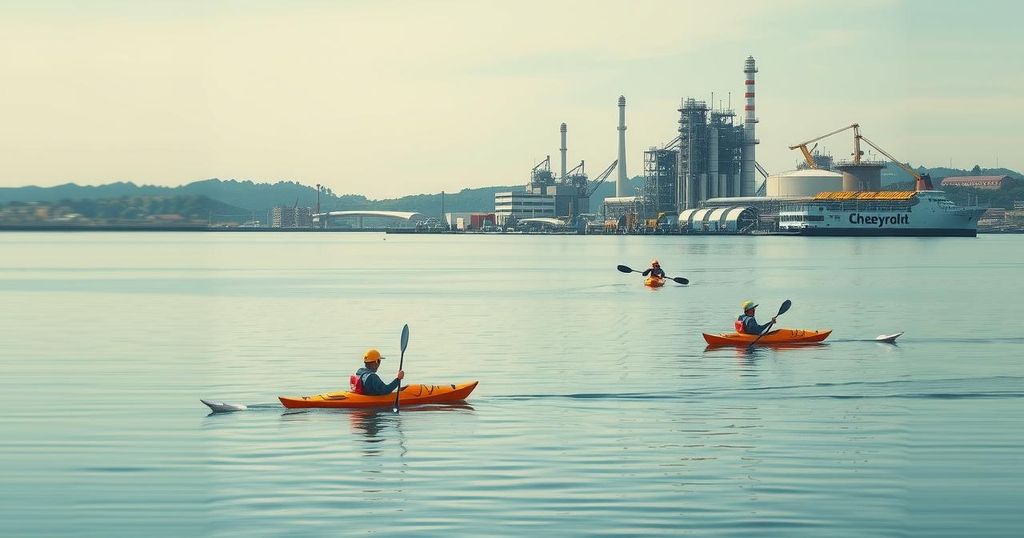Technology
A. VÁS, AMAZON, CALIF, CALIFORNIA, CHEVRON, CHEVRON LONG WHARF, CLIMATE, ECUADOR, ENVIRONMENT, EVENTS, GOD, GODOF, KICHWA PAKKIRU, LONG WHARF, NAD, NADINO CALAPUCHA, NEWS, NORTH AMERICA, PHOTOGRAPHY, PRIZES, RICHMOND, SAN FRANCISCO BAY, SOUTH AMERICA, UNITED STATES, WAORANI, WAORANI PEOPLE
Jamal Walker
0 Comments
California to Examine Its Amazon Oil Ties Following Pleas from Indigenous Leaders from Ecuador
Indigenous leaders from Ecuador call on California to assess its ties to Amazon crude oil, reflecting on the broader implications for Indigenous rights and environmental degradation. The California Senate introduced a resolution addressing these issues as Ecuador prepares to auction new oil blocks, raising alarm over climate concerns. The delegation’s visit underscores the urgency of examining California’s role in global oil consumption and its impact on vulnerable communities.
RICHMOND, California — As Indigenous leaders from Ecuador’s Amazon paddled kayaks through the choppy waters of San Francisco Bay, they drew attention to the troubling ties between California and the crude oil extracted from their homelands. Their June 2025 visit coincided with the introduction of a pivotal resolution in the California state Senate, urging officials to reassess the state’s role in importing Amazon oil. This comes at a time when Ecuador plans to auction off 14 new oil blocks covering over two million hectares of rainforests, much of which falls within Indigenous territories.
The leaders argue that the upcoming auction contradicts a recent national referendum in which Ecuadorians overwhelmingly voted to keep crude oil underground in the ecologically sensitive Yasuni National Park. This push for preservation stands in stark contrast to neighboring Brazil, which recently auctioned land for potential oil production near the Amazon, despite environmental protests.
Juan Bay, the president of the Waorani people, expressed the urgency of their mission, stating that it is crucial for Californians to hear their message about the origins of the crude they consume. Their delegation’s kayak journey was not just symbolic; it aimed to underline the deeper connections between local and global environmental struggles. “We are here to elevate our voices and share our fight against oil expansion,” he said.
During their time in Richmond, the delegation engaged with local residents, sharing stories about the Amazon and discussing the dire climate threats they face. For Kichwa Pakkiru spokesperson Nadino Calapucha, the emotional resonance of his surroundings was profound. He remarked, “It was as if the animals were welcoming us,” highlighting the sense of unity felt among those fighting environmental degradation.
California stands as the largest global consumer of Amazon oil, with significant amounts refined and utilized as fuel within the state. The lawmaker behind the resolution, State Senator Josh Becker, underscored the importance of the delegation’s visit in advocating for a balanced approach to environmental justice. “They are at the front lines, defending their land,” Becker stated in the Senate.
Bay referred to a March 2025 ruling from the Inter-American Court of Human Rights, which found Ecuador had infringed upon Indigenous rights by permitting oil extraction in areas like Block 43. He challenged California to reconsider its import practices, warning that the state risked complicity in human rights violations against Indigenous communities.
The dialogue around these oil ties took fresh urgency with the unveiling of a report by Amazon Watch, detailing the financial and environmental risks of drilling in Indigenous territories. Kevin Koenig, the organization’s director, characterized California’s reliance on Amazon crude as an addiction, calling for immediate action to terminate this dependency.
“California needs to recognize its responsibility,” Koenig said. “Its actions are directly impacting Indigenous rights, biodiversity, and climate.” He painted a picture of the interconnectedness of California’s environment with the Amazon, drawing attention to how sourcing Amazon oil exacerbates vulnerabilities to drought and wildfires in California.
The resolution marks a crucial step forward, aiming to shed light on how California’s energy consumption contributes not just to the loss of cultural heritage but also to deforestation and ecological damage. If passed, it could ignite a broader conversation about energy policies and their far-reaching consequences. The vote on the resolution is expected in the coming weeks, highlighting California’s potential role in championing Indigenous rights and fostering effective climate action in the region.
California, as one of the world’s largest economies, must grapple with the implications of its oil imports from the Amazon and how these choices perpetuate cycles of environmental harm and social injustice. The message from these Indigenous leaders is clear: The fight against oil extraction is not just theirs, but one that resonates deeply with communities worldwide confronting similar challenges.
The visit of Ecuadorian Indigenous leaders to California highlights urgent calls to reexamine the state’s involvement in Amazon oil imports and the implications for Indigenous rights and environmental health. With California’s dependency on Amazon crude linked to significant ecological and social issues, legislative attention may mark a turning point in addressing these complex concerns. The upcoming vote on the resolution could be pivotal in shaping the dialogue around energy usage and its broader ramifications on climate justice and human rights.
Original Source: apnews.com




Post Comment